Who Can Sue Trump Over Emoluments?
CNN/Stylemagazine.com Newswire | 1/24/2017, 9:23 a.m.
By Laura Jarrett
CNN
(CNN) -- Three days into office, President Donald Trump was sued for allegedly violating the Constitution he took an oath to defend, but questions remain whether those behind the lawsuit have any standing to pursue a case.
The central legal argument lodged by the ethics accountability group on Monday was that the President has violated the foreign emoluments clause of the Constitution by accepting foreign payments through his business ventures.
While the initial complaint filed by the self-described non-partisan group Citizens for Responsibility and Ethics in Washington, raises a host of significant questions in somewhat uncharted legal territory, most experts have zoned in on a threshold issue that may stand in the way of the plaintiffs getting their day in court: standing. In order to sue in federal court, the Supreme Court has said it is not enough for you to show a mere interest in an issue, you must show your standing to sue by sufficiently articulating how you suffered a concrete and particularized injury.
Some legal experts questioned when the lawsuit was filed on Monday, even if the President is wrongfully accepting cash from foreign governments in violation of the emoluments clause, how is this ethics group -- which identifies itself as a independent ethics group that "works on behalf of the public to foster an ethical and accountable government and reduce the influence of money in politics" -- being harmed?
CREW's answer is that Trump's situation has forced it to "divert essential and limited sources" from its regular government watchdog role and "will essentially be forced into the role of litigating and educating the public regarding (Trump's) Foreign Emoluments Clause violations," if a court does not stop him, according to the complaint.
One of the lawyer's leading the lawsuit revealed Tuesday the group's efforts might be getting re-enforcements, as Trump's business competitors have contacted the ethics group and may be joining the fight.
"We've heard from people like (Trump's business) competitors ... really an outpouring of calls and emails," Ambassador to the Czech Republic Norman Eisen, an ethics lawyer for President Barack Obama, told CNN's Chris Cuomo on "New Day." "We're now sorting through those, I anticipate that you're going to see others step forward as well, of course there are always concerns about retaliation when you're taking on the most powerful man in the world."
For some experts, however, this argument on standing is unlikely to hold up in court.
"The idea that a group has standing because it has to spend time on this more than other things is just so silly that I can't believe they put it on paper," said Stanford Law School Professor Michael McConnell in an interview with CNN.
Trump told a group of reporters on Monday that the lawsuit was "without merit."
The White House did not immediately respond to a request for comment on the lawsuit.
But some suggest that the addition of business competitors to the litigation against Trump could be a game changer.
"A business competitor might have a stronger argument -- there you can say the emoluments clause is supposed to prevent the President from doing business with foreign companies and it's taking away business from me," said Larry Noble, general counsel at the Campaign Legal Center.
Either way, CREW's lawyers say the law is squarely on their side. In addition to Eisen, the group is represented by Richard Painter, a former ethics lawyer for President George W. Bush, and constitutional law scholars Erwin Chemerinsky, Laurence H. Tribe, Zephyr Teachout, and Deepak Gupta.
The group specifically points to an 1982 Supreme Court case, which they contend shows CREW has standing in this case.
"In the Havens Realty case, the Supreme Court recognized that when an organization has a preexisting social purpose and the organization has to step away, or divert resources from that purpose, that organization has standing," Eisen explained in an interview with CNN.
"We've now had to divert our resources to address the blatant violation of our nation's most fundamental law. ... Of course an organization is injured when it has to respond to a flagrant violation of the law."
But in other contexts, the courts have often used a more exacting standard to throw out a case on standing grounds. For example, in 2013, the Supreme Court famously dismissed California's Proposition 8 appeal, finding that private parties did not have standing to defend California's ban on same-sex marriage.
Some experts say given the unprecedented nature of this case, a court may ultimately allow this ethics group's claim to move forward (at least in the short term) and wait to decide whether they can make out a factual case.
"Standing is always tricky for non-profit organizations -- and this a novel issue, frankly," Noble said. "A court may very well say (Trump's actions) have harmed them enough."
CNN's Cristina Alesci contributed to this report.





